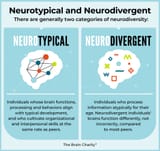>>938914362
Refer to
>>938912093
In actual reality, not your imagined one, many traits are shared between several types of neurodivergence, many real-life consequences are common to all or most of them, many therapeutic options apply to several of them, and the term is useful daily for actual, real-life people that are just concepts for you.
One example of many : alexithymia is common in patients with ADHD, autism, depression, and some neurological issues. It is just a medical term to describe one symptom: difficulties in identifying one's own emotions or expressing what they are.
If a patient asks me how people seem to know how they're feeling without needing to think about it, I can say "it comes naturally to neurotypical people" without having to spell out every exception or resorting to more medical jargon.
If I'm talking with someone who doesn't have this issue in my office, and they ask me what those colorful wheels with basic emotions spelled out on them are, I can say "that's a tool I use with neurodivergent people".
If I'm reading a paper that explains the use of such tools, or even just the manual that goes with them, I can expect them to use "neurodivergent" and "neurotypical" because it's quick and says everything that needs to be said.
Outside of actual therapy, people use those words as shorthand, because that's what they are. It helps support networks communicate efficiently without having to say "normal" or "abnormal", since those words are way more emotionally and politically charged. And expert patients giving advice to other people with similar problems and using similar strategies are one of the best ways we know right now to improve outcomes, and efficient, neutral vocabulary goes a long way to let them help each other.




